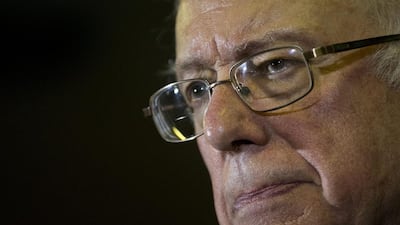This year’s American presidential election is full of activists and populists. On the Republican side, Donald Trump has single-handedly moved the boundaries of acceptable American political discourse to include overt incitement against immigrants and religious groups. But it is Bernie Sanders, the surprise Democratic front-runner, who has been cast as the real radical candidate of the election season.
A self-described democratic socialist, Mr Sanders has run a protest campaign focused on one issue: economic inequality. With every issue, from healthcare reform to immigration, Mr Sanders tries to work in something about the economy.
Despite being the longest-serving independent senator, Mr Sanders has branded himself as a bold outsider ready to reform the economy and empower the middle class.
Now that mainstream voters are taking him seriously, it is helpful to ask exactly how radical Mr Sanders is. His ideas on inequality are indeed unique for the US but when it comes to foreign policy, he is surprisingly orthodox. In recent debates, he has tried to divert attention from foreign policy issues, instead focusing on the economy and wealth distribution. Take one look at his record on the Middle East and it is clear why he doesn’t want to talk about foreign policy.
While he has been firmly supportive of rapprochement with Iran, saying that “[what] we’ve got to do is move as aggressively as we can to normalise relations with Iran”, he has not articulated concrete steps for combating ISIL's expansion or ways to bring regional stability.
As a senator, Mr Sanders voted against the resolution that allowed former president George W Bush to launch military action against Iraq. As a candidate, he has used his stance on the Iraq war to advocate a broad coalition effort against ISIL.
It is in the details – how would Mr Sanders keep the coalition running smoothly, what would he do about the rifts between Turkey and Russia in Syria, how would he find a solution to the war in Yemen – that he fails to provide concrete plans.
The problematic and least radical aspect of the senator's foreign policy is his unwavering support for Israel. When it comes to the Israel-Palestine conflict, Mr Sanders’s economic radicalism falls by the wayside.
He has endorsed continuing military aid to Israel along with economic aid to the Palestinians, which has proven to be an effective tool for both Israel and the United States to exercise undue influence over Palestinian decision-making, as evidenced by the withholding of aid after the PLO pursued statehood recognition at the United Nations. Additionally, the senator has seldom condemned the Israeli occupation of Palestinian land and said nothing of Israel’s aggression in Gaza over the last decade.
Some have argued that Mr Sanders’s support for Israel is because he is Jewish. Yet, he has barely spoken about a faith-based connection to Israel. He has only cited his religion as an inspiration for progressive activism, especially regarding the struggle for civil rights equality.
Instead of taking a progressive stance, Mr Sanders relies on the security-based narrative that Israel has spun over the international community for decades. Where is the passion and critical thinking that has captured the imagination of millions of Americans and has demonstrated that fresh conversations are possible?
For a politician running a campaign against the “rigged” political and economic system that continues to disenfranchise millions, he is surprisingly content with the prevailing Washington orthodoxy on Israel (and also gun control, but that is a separate issue altogether).
The perplexing part is that Mr Sanders’s orthodoxy comes at a time when American diplomats in Israel are signalling a readiness to chart a new course on the conflict, one that doesn’t accept Israeli PR at face value.
Addressing a security conference last week, the US ambassador to Israel, Dan Shapiro, noted that “too many attacks on Palestinians lack a vigorous investigation or response by Israeli authorities, too much vigilantism goes unchecked, and at times there seem to be two standards of adherence to the rule of law: one for Israelis and another for Palestinians”.
For any close observer of Israel’s occupation, the ambassador’s assessment is not only correct but also old news. But the comments, which basically equate Israel to an apartheid state, triggered a furious response from Tel Aviv. A former aide to Israeli prime minister Benjamin Netanyahu resorted to anti-Semitic slurs, calling the US ambassador a “little Jewboy”.
US president Barack Obama is unlikely to force any substantial change in the American-Israeli relationship. But the remarks of the US ambassador signal that a change, however small, is afoot in the special relationship.
Mr Sanders understands the source of his appeal. American voters are attracted to his exciting ideas about the economy because they are fresh and bold. People are right to be excited but that doesn't change the fact that many of Mr Sanders’s other political ideas are unsophisticated and traditional, especially when it comes to the Middle East.
Mr Sanders has pledged to curtail Wall Street’s influence in Washington; he should do the same with Tel Aviv's if he is really serious about being a radical.
jdana@thenational.ae
On Twitter: @ibnezra

